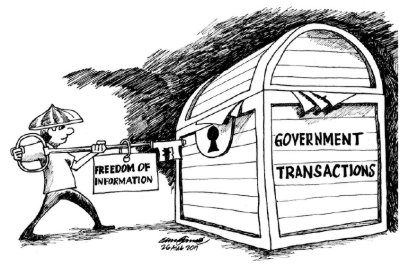| |
.
. |
|
Freedom of Information Act: A deliberate delay?
|
|
by Edward C. Torcuato, NAMFREL Assistant
Project Coordinator |
|
from
NAMFREL Election Monitor Vol.2, No.19
|
|
. |
After it was drafted in 2008, House Bill
3732, otherwise known as the “Freedom of Information Act of 2008,”
is yet to be ratified as the 14th congress under the leadership of
Speaker Prospero Nograles fell short by seven (7) congressmen to
complete the 135 votes needed. Because of this failure, Speaker
Nograles drew criticisms from journalists.
The bill was drafted to give people access to public records and
information regarding transactions that involve public interest, as
provided under Section 28, Article II of the 1987 Constitution. One
of the salient features of the proposed bill is for all government
agencies to make their transactions available to the public
utilizing all possible means (bulletin boards, agency website) and
that they “regularly publish and disseminate, at no cost to the
public and in accessible form, by print and through their website,
timely, accurate and updated key information.”
. |
If the proposed bill becomes a law, the public will be armed
with information on the transactions that the various
government agencies are entering into. This can now pave the
way for people’s participation in good governance, and for
the concerned people to play a vital role in evaluating if
these government agencies are efficient in their dealings
and transactions. The more the people are aware, the lesser
the chances of the public officials to usurp their
authority.
A good number of civil society organizations (CSOs) and
non-government organizations (NGOs) in the Philippines have
been closely monitoring the ratification of the bill, and
the eventuality of having it signed into a law. CSOs and
NGOs that advocate good governance have highlighted the
importance of gaining access to records of government
transactions as this will allow them to make a more
intensive evaluation to determine the legitimacy of such
transactions, thus upholding transparency.
. |
 |
|
If what these CSOs and NGOs claim holds
true, then the ratification of the bill during Pres. Aquino’s term
can become an affirmation of the administration’s moves to combat
corruption. Hopes are high as the current administration entered
into the arena with the curtailment of corruption as one of its
programs. From the campaign period for the 2010 presidential
elections up to present, the public still eagerly awaits the
government as it moves forward to translate its “Kung walang
corrupt, walang mahirap” vision into achievable plans of actions.
At present, only a few entities have access to selected government
records and other information. In the occurrence of irregularities,
only a few can cry foul, and doing so with very limited pieces of
evidence can be futile once engaged in a legal battle in efforts to
sanction the perpetrators of corrupt practices. If a significant
portion of the general public is aware of government transactions,
then the chances of eradicating corruption is higher.
Concerned citizens want government officials that undertake
transactions involving public interest to be held accountable and
corresponding consequences for failure to comply should be upheld
and enforced to ensure that irregularities in government
transactions are appropriately dealt with.
With the lackluster action of the House of Representatives on the
Freedom of Information bill during the 14th Congress and now the
15th Congress, concerned groups are doubtful about the capacity of
legislators to see the bill passed into law. An article by the
Philippine Center for Investigative Journalism (PCIJ) on House
Speaker Prospero Nograles’ wealth surge in 14 years hints that this
could be one of the reasons why some legislators seemed to be
reluctant in allowing the bill to gain mileage for ratification and
passage.
Concerned groups are wary that the delay in ratifying the bill could
be deliberate as it could work against any government official,
including legislators, once it becomes a law. |
|
|
| |
.
.
. |
|
| |
| |
|
|

